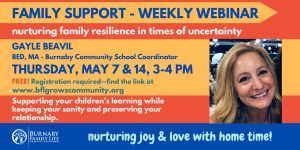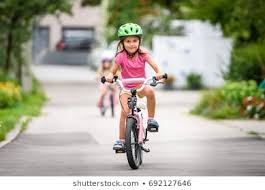Support Your Child’s Learning, Keep Your Sanity and Preserve Relationships in the time of COVID19: Does this sound like a tall order? It is! Most parents right now and struggling to find ways to balance all the demands and various needs of their family. To get ideas for managing this monumental task, consider this opportunity being offered by Burnaby Family Life:

What to know about home learning: “Supporting your kids’ learning while keeping your sanity and preserving your relationship.”
When: May 7, 2020 03:00 PM Pacific Time (US and Canada)
Topic: Burnaby Family Life – Weekly Expert Talks families “What to know about home learning: “Supporting your kids’ learning while keeping your sanity and preserving your relationship.”
Register in advance for this webinar:
https://us02web.zoom.us/webinar/register/WN_YVNDT7JbTL608poUzACZdg
After registering, you will receive a confirmation email containing information about joining the webinar.
———-
Webinar Speakers
Gayle Beavil (Community School Coordinator @Second Street Community School (and supporting Armstrong Elementary & Cariboo Hill Secondary))
Gayle Beavil, BEd, MA, is a Burnaby educator who has been an elementary teacher in Burnaby classrooms for 15 years, as well as been a Faculty Associate at Simon Fraser University, where she taught student teachers in the Professional Development Program for two years. For the past 13 years, Gayle has been a Community School Coordinator, working with community partners and school staffs to enrich the curriculum, support and strengthen families with responsive programs and services, as well as create and build community in Burnaby, through hosting groups, connecting folks and building understanding. One of Gayle’s passions and strongest beliefs is: “If the family is connected and happy, then the kids are more likely to be connected and happy — and connected and happy kids are more ready, and able to learn.”










